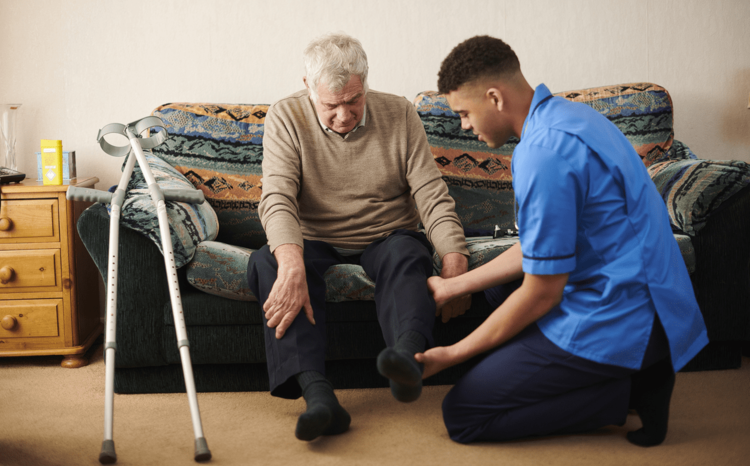Technology: How social care can emerge from the Covid-19 crisis
- 20 May 2020

Tested to the limits by the current pandemic, social care has been under the spotlight as never before. When the sector emerges from the battle with Covid-19, Jonathan Papworth, co-founder and director of Person Centred Software, sees an opportunity to build a new technology-enabled delivery model that will transform performance, earning long-deserved recognition alongside the NHS.
During times of crisis we achieve incredible things. Huge industries change direction on the head of a pin, entire business models adapt, but most of all – people become readier to embrace new ideas. That’s why I believe the social care sector will emerge from the Covid-19 pandemic more ready to adopt new methods of operating.
As a sector of more than 18,500 providers, roughly 70% of which operate their business on paper, it is not too difficult to see why it was almost impossible to build a real-time picture of what’s been happening in care homes during this terrible outbreak.
Yet even the most traditional care home owners should know that technology is not something to fear – it’s an enabler. Coronavirus response has seen providers work quickly to overcome challenges surrounding self-isolation and social distancing. For example, many care homes are now using digital tools such as video conferencing and software to enable remote connections and transparency.
More broadly in healthcare, technology is becoming a game changer as mass scale data mining fuels scientific discoveries. The tracking app developed by Kings College London for example, has unlocked insights on Covid-19 symptoms, spread and severity that are vital to containment, treatment, response and learning.
Such developments, combined with everybody’s renewed appreciation of technology, mean attitudes are changing forever. As such, now is the ideal time to create a more effective and responsive framework to care for the elderly and vulnerable.
Technology as a platform for truly person-centred care
Social care should be focussed on people – those being cared for, their loved ones, and the carers themselves.
The coronavirus outbreak has highlighted how woefully inadequate paper processes are for a sector as vital to society and as overstretched as ours.
I believe technology is the only way to create a more person centred-focussed adult social care system. By digitising care planning processes and evidencing care using mobile technology, providers can make time efficiencies that empower carers. Not only can app-based care evidencing tools save carers time, they also give them the tools they need to do their job. They provide reliable reminders, highlight concerns, and enable carers to monitor resident wellbeing.
Most importantly of all, they make it possible to spot care trends – good and bad – and continually improve quality of care.
Taking care of our vital care system
Covid-19 has proved that social care is just as important to us all as the NHS. However, social care gaining its deserved recognition has also laid bare a huge information gap.
To make our sector truly fit for purpose as we emerge from Covid-19, it is vital to begin the process of digitising residents’ care interactions and care planning, and work to create an integrated system for digital reporting.
Even more important than providing statistics for public bodies, unified data provides a picture of what’s happening on the ground making it possible for staff to respond promptly. In future pandemics, urgently needed equipment, supplies, staff or support could be sent where it is most needed.
More important still is the ability of our sector to continually improve by sharing learnings, identifying health trends, improving ways of delivering care and enabling links with the NHS through data modelling.
Connecting data means connecting care
Before the coronavirus outbreak, the care sector was already in crisis. From over 120,000 unfilled job vacancies to underfunding, providers have faced one challenge after another.
When this pandemic finally ends, staff and funding shortages will again become major pain points for providers. Acting now to fully digitise the sector could relieve the pressure considerably and create vital capacity.
Icon-driven apps that evidence care at the point of care have been shown to save each carer up to an hour a day in paperwork. In a sector that employs more workers than the entire NHS with an estimated workforce of 1.49 million, such additional care capacity could be truly transformational.
Better still, the insights generated by digital systems will create an environment of constant improvement by highlighting where provision needs to be developed, and identifying trends across all areas of resident wellbeing from sleep, nourishment, hydration, and medication to exercise and mental stimulation.
Creating a way to digitise our sector and unite the insight generated, is the basis from which we can deliver the quality, individual-focussed, outcome-oriented care people deserve.
The path to outstanding provision
It is my hope that the care sector will emerge from the coronavirus crisis with a renewed sense of confidence and accomplishment. It may have taken a catastrophe to show us what can be achieved when we urgently pull together, but there is so much more we can do to improve the lives of care residents and care workers.
My hope is that providers who have seen how technology helps in the response to Covid-19, will be encouraged to become part of a ground up, sector-wide movement to digitise care evidencing and care planning systems.
If adopted more widely, technology will undoubtedly help providers to make efficiencies, saving time and money. But more than that, a move to unify and protect care data at a national level will unlock unimagined benefits for those in care and those providing care.
Technology will put people and passion back in the driving seat of care.






2 Comments
As a previous comment suggests this is mainly aspirational. It would need good business case justification. There is a vast potential mass of social care information to be recorded (potentially) by an overstretched underpaid workforce. Just think of yourself recording about all your sleeping, getting up, toileting, washing, feeding, medication, moods, socialisation, treatments, leisure activities according to predetermined plans (also recorded), with systems distributed over many thousands of locations. You will probably also have inadequate IT investment, equipment, support and reliability.
Maybe the sector needs to move in sensible steps from pie in the sky to achievable reality. And in a totally underfunded sector, whose problems governments have ducked for decades, that reality will need good business reasons for advancing.
Remove all the flannel and what is left? Coronavirus is a heaven sent opportunity to advance the programme of collecting cradle-to-grave integrated health and care records for every UK citizen, these records to be at the disposal of the Secretary of State for Health and Care, who, according to UK law, is the owner of these records. The actual owners of the records are to have no legal right to determine who has access to them, or for what purposes they are used. According to the Health and Social Care Act 2012, a breach of confidentiality, when directed by the Secretary of State is not a breach of confidentiality. (The Lord Chancellor seems to have overlooked the incoherence of that piece of legislation and its incompatibility with data protection law. Who cares? Data protection law is not enforced in the UK.) Surveillance is positively flourishing in the Coronavirus crisis.
Comments are closed.